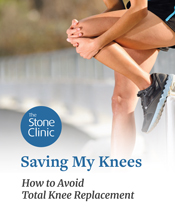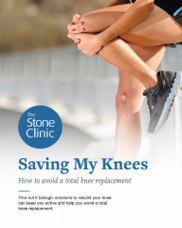Meniscus Transplant Surgery Rehab Protocol & Recovery Time
- Partial weight bearing for 4 weeks. Initiate at 10-20% for weeks 1-2, then progress up to 50% for weeks 3-4. Walk with crutches and a brace locked in extension. Consider a heel lift in opposite shoe to normalize gait.
- Surgical knee will be in a hinged rehab brace locked in FULL EXTENSION for 4 weeks post-op.
- Regular assessment of gait to avoid compensatory patterns.
- Regular manual mobilizations to surgical wounds and associated soft tissue to decrease the incidence of fibrosis.
- No direct palpation to surgical portals x 4 weeks. Consider the edge of the bandages as the “no touch zone” (approximately 2 inches in all directions). See wound care protocol for full details.
- No resisted leg extension machines (isotonic or isokinetic).
- No high impact or cutting / twisting activities for at least 6 months post-op.
- No resisted lateral movement for 12 weeks.
- M.D./nurse follow-up visits at Day 2, Day 14, 1 month, 3 months, 6 months, and 1 year post-op.
- During the first 4 weeks: TWICE PER DAY: Without brace, allow GRAVITY ONLY (passive only) to bend knee back as tolerated BUT NO MORE THAN 90 DEGREES for a good knee stretch without increase in pain. Relax knee and stretch for 60 seconds.
- DO NOT FORCE FLEXION >120 DEGREES FOR THE FIRST 6 MONTHS AFTER SURGERY
Week 1
- Nurse visit day 2 post-op to change dressing and review home program.
- Ice and elevation every 2 hours for 15-20 min each session.
Manual
- Soft tissue treatments for edema / pain control and to posterior musculature, ITB, add, quad, calf. No direct palpation of surgical portals x 4 weeks.
Exercise
- Straight leg raise exercises (lying, seated, and standing), quadriceps/adduction/ gluteal sets, ankle pumps.
- Well-leg stationary cycling, upper body ergometer for cardio. Add upper body and core conditioning.
- Daily edge of bed dangle for passive knee flexion (allow knee to hang in pain-free range with light stretch).
Goals
- Decrease pain/edema.
- Passive range of motion <90 degrees to avoid pulling on sutures.
- Gait-partial weight bearing with brace locked in extension.
Weeks 2 - 4
- Nurse visit at day 14 for suture removal and check-up.
Manual
- Continue with soft tissue treatment for edema/pain, posterior musculature, iliotibial band, adductor, quadriceps, calf.
Exercises
- Continue with previous, manual resisted exercises (i.e. PNF patterns) of the foot, ankle and hip. Trunk stabilization program, three limb plank. Single leg balance and proprioceptive exercises.
- Aerobic exercises (i.e. unilateral cycling, upper body ergometer, Schwinn Air-Dyne with uninvolved leg and arms only, well body bike, single leg row machine).
Goals
- Decrease pain/edema.
- Passive range of motion 0-90 degrees.
- Gait- partial weight bearing with brace locked in extension.
Weeks 4 - 6
- M.D. visit at 4 weeks post-op, will wean off the use of rehab brace.
Manual
- Stretching, exercises and manual treatments to improve range of motion (especially flexion). Initiate surgical portal scar mobilization if portals are completely closed.
Exercises
- Incorporate functional exercises (i.e. partial squats, calf raises, mini-step-ups, proprioception).
- Stationary bike low cadence, low resistance.
- Slow walking on treadmill for gait training (preferably a low-impact treadmill).
Goals
- Gait- unlock brace; wean off brace- increased gait mechanics.
- Active range of motion 0-115 degrees.
Weeks 6 - 8
Manual
- Continue as needed for ROM, decrease pain, muscle guarding.
Exercises
- Increase the intensity of functional exercises (i.e. cautiously increase depth of closed-chain exercises., Shuttle/leg press). Do not overload closed or open-chain exercises.
Goals
- Gait- no limp present, good mechanics.
- Active range of motion 0-<120 degrees.
- Tolerate 90/90 squat.
Weeks 8 - 12
Manual
- Continue with soft tissue, joint mobilizations as needed.
Exercises
- Add lateral training exercises (side-step ups, lateral stepping).
- Introduce more progressive closed chain and agility leg exercises.
- Patients should be pursuing a home program with emphasis on sport/activity-specific training.
- Consider road cycling in saddle.
Goals
- Active Range of Motion approx 120 degrees flexion (do NOT force flexion >120 degrees as per MD).
- Initiate lateral training with no resistance.
Weeks 12 - 16
- Complete 3 month sports test and initiate return to running program.
- Increase intensity of low-impact cardio including bike, swimming, elliptical, etc.
- Increase the intensity of strength and functional training for gradual return to activities.
- Initiate resisted lateral training (theraband resisted side-stepping).
Goals
- Complete and pass Sports Test.
- No high impact activities for 1 year unless cleared by MD.
NOTE: All progressions are approximations and should be used as a guideline only. Progression will be based on individual patient presentation, which is assessed throughout the treatment process.
Meniscus Transplant - Who It's For & What to Expect
Our BioKnee® program biologically reconstructs the knee joint often using a meniscus transplant. Head here to learn about our alternative to knee replacement.

